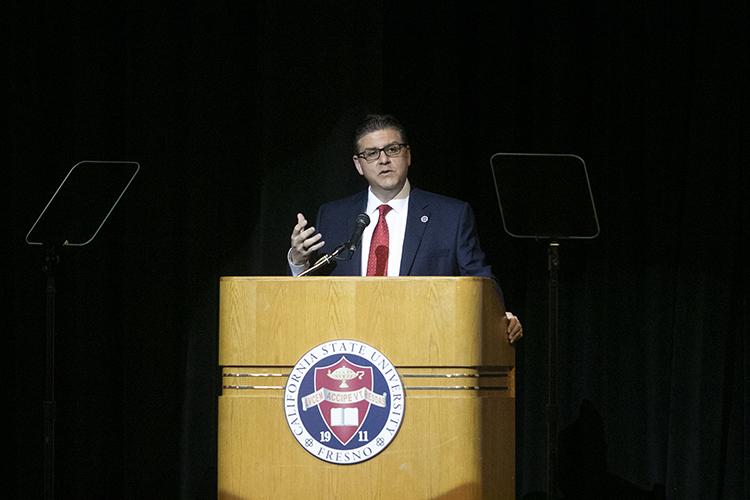Fresno State President Dr. Joseph I. Castro spoke to the university’s faculty and staff about the school’s projects, goals and outlook for 2019 in the annual spring semester assembly to faculty and staff on Jan. 16 in the Satellite Student Union.
Castro began with a brief look back on the university’s past 10 years. He said that in 2009, the university was in a financial survival mode, dealing with budget cuts, furloughs and tuition hikes. He said that when he was appointed in 2013, the school was still dealing with aftermath of the economic recession.
Since then, Castro said the state budget has increased each year, along with scholarship funding, graduation rates and staff and faculty pay. He added that between 2013 and 2018, Fresno State hired more tenure-track professors than all but one other CSU.
Castro said that his mission of boldness for the university includes a graduation rate goal of 70 percent by the year 2025.
“We will need to first get to 60 percent,” Castro said. “And we’re closing in on that.”
Discussing efforts to achieve this 2025 target, Castro announced a partnership between the College of Arts and Humanities and the Division of Continuing and Global Education that will offer an online degree completion program with a major in liberal arts for students who have left the university in good academic standing, but did not complete their degree. The first group of qualified students has already been invited to begin this “new pathway” in the fall semester.
“I’ve heard countless stories from former Fresno State students who earned a substantial number of academic units, credits. But for a variety of personal reasons they were never able to finish their degrees,” Castro said. “We want you back to finish your degree at Fresno State.”
Fresno State’s Visalia campus has also added new degree programs, including business, teacher education, multilingual/multicultural education and a planned RN/BSN program in nursing, Castro said.
Castro discussed several campus construction projects planned for the upcoming year, such as the design and renovation of three high-impact science labs in the College of Science and Mathematics, as well as the renovation of several laboratories in the Lyles College of Engineering.
Castro said the university will also begin the process of issuing a request for proposals for a public-private partnership to fund the development and construction of a new $125 million central utility plant to provide sustainable, cost-effective heating and cooling to the campus.
The design phase for the new University Student Union will begin this year, Castro said. A feasibility study for a new performing arts facility will also be initiated.
Castro said the university invested more than $94 million in construction and deferred maintenance between 2014 and 2017, and invested $24 million in 2018.
Castro announced the university’s first Principles of Community, a guiding set of ethical and behavioral values. The principles were drafted by a task force of 23 faculty and staff members based on the results of focus groups, polls and surveys, in which faculty and staff participated in over the past two years.
Castro invited the faculty and staff to share their thoughts on the initial principles. He said that these principles would not be enforced, but would “exemplify what we aspire to be.”
Castro also recognized four faculty and staff members whose work has exemplified these principles, including Dr. Benjamin Boone, professor of music performance and composition; Louise Pacheco, recruitment counselor in the Office of Admissions and Recruitment; Ashley Ilic, director of Brand Strategy and Marketing; and Larry Salinas, executive director of Governmental Relations.




